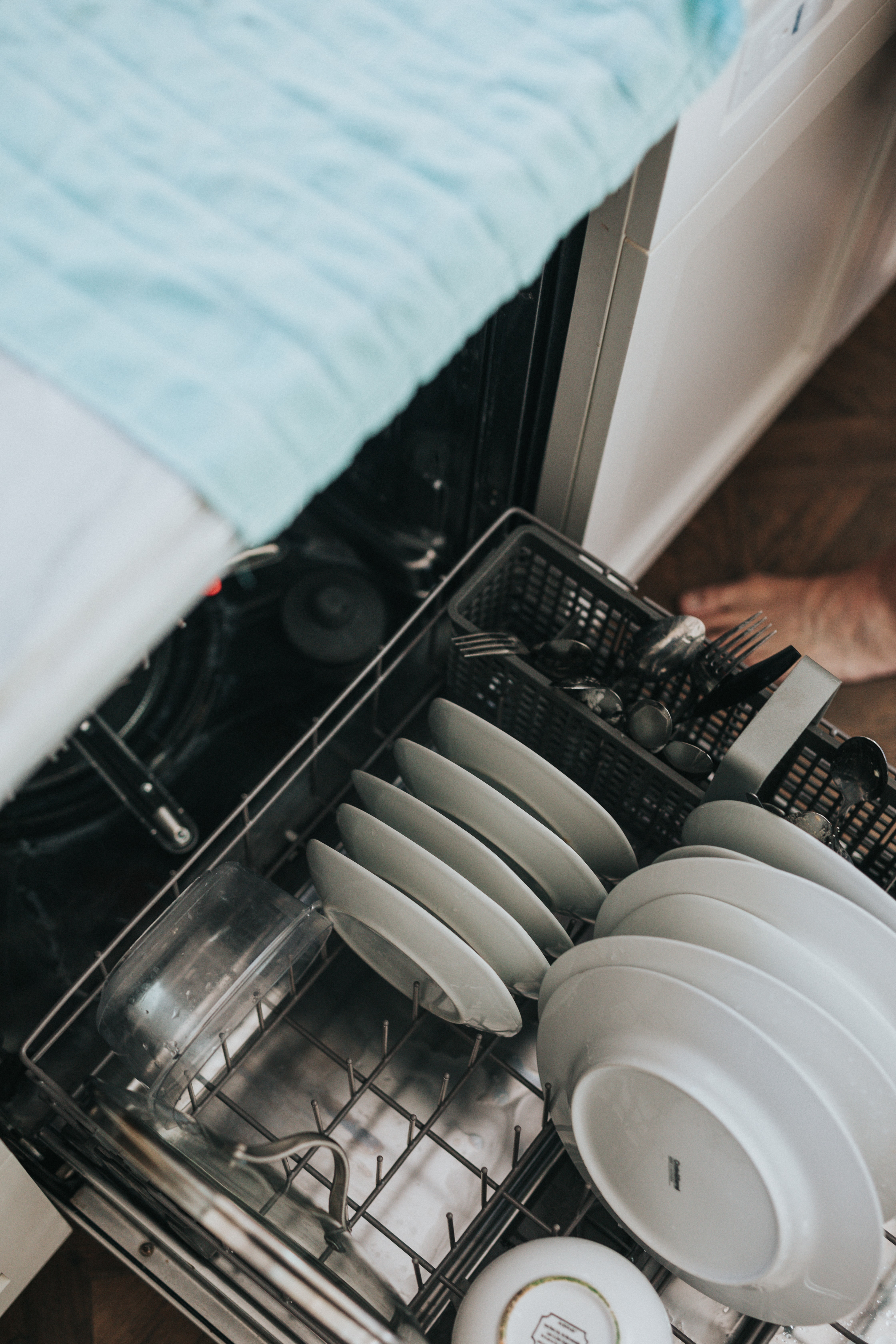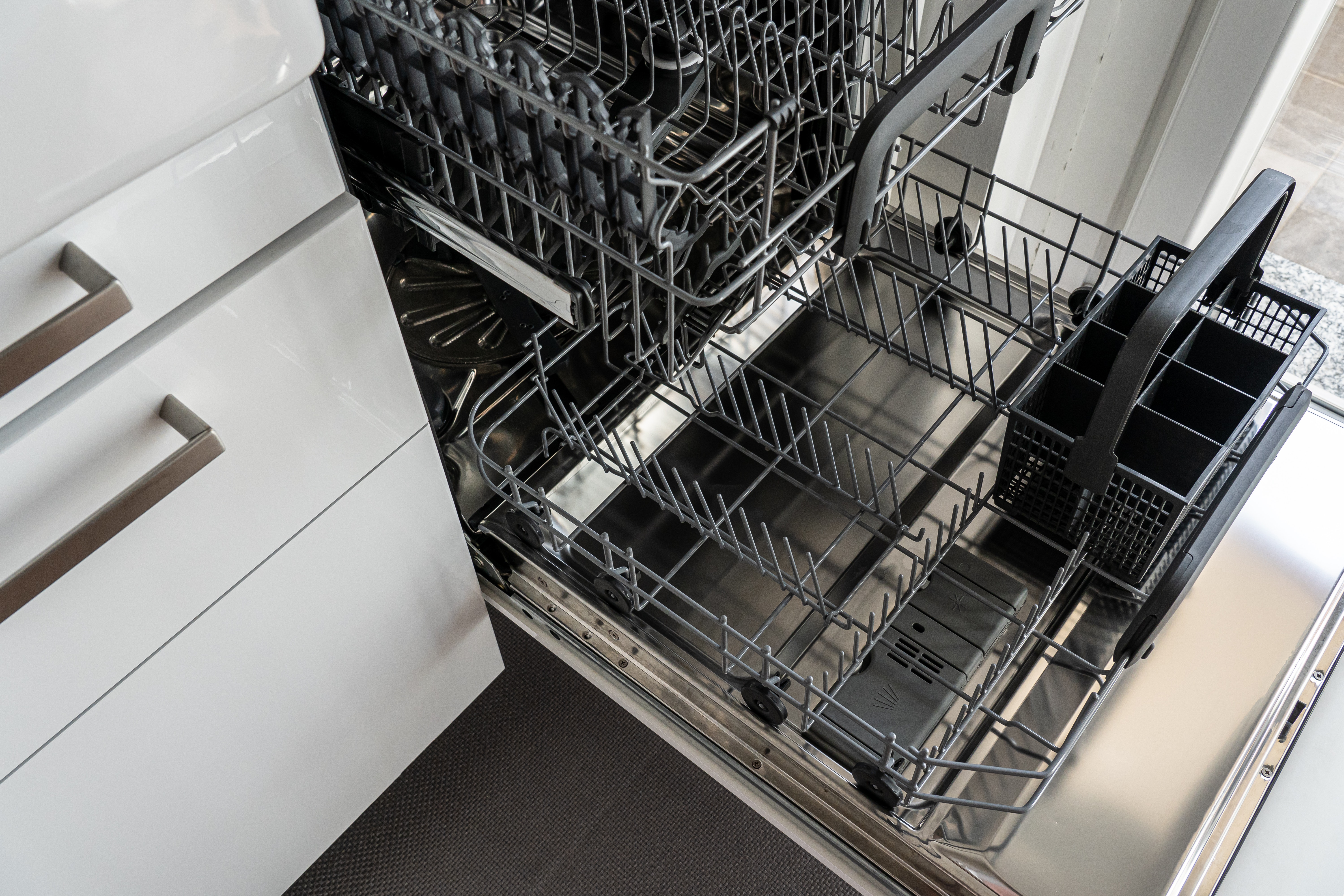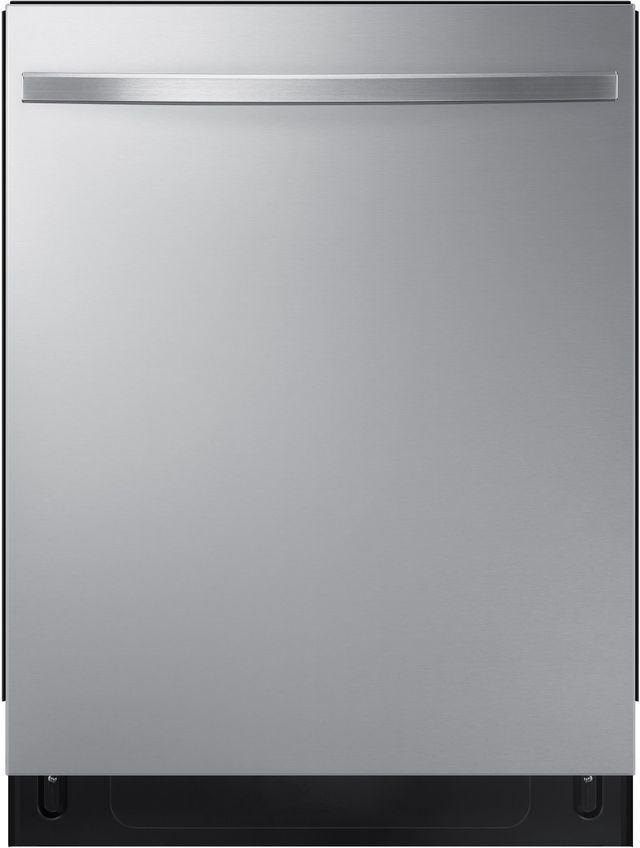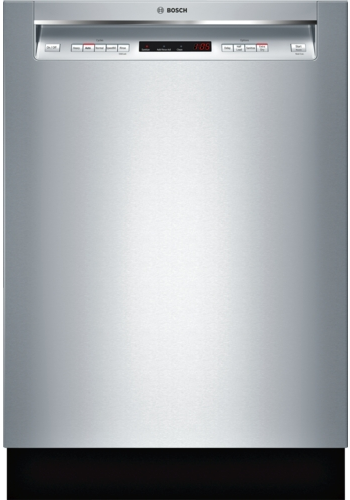
At a Glance:
How Long Does a Dishwasher Take?
Dishwasher Cycles: What Are They and What Do They Do?
How Does Cycle Time Affect Eergy Efficiency?
Why is it Important to Choose an Energy-Efficient Dishwasher?
How do you get your dishes cleaned? Do you handwash them or use a dishwasher? If you use a dishwasher, then you're certainly on the right track. However, if you still handwash, you'll want to consider switching to a dishwasher because a dishwasher offers so much more in terms of energy, water and time conservation and efficiency. More often than not, when people who still hand wash their dishes are asked why they don't switch to using a dishwasher, the responses are usually similar. A lot of people believe that dishwashers aren't as efficient as they're made out to be, especially in terms of time efficiency. This begs the question, "How long does a dishwasher take?" Read on to find out!
How Long Does a Dishwasher Take?
The belief that dishwashers aren't effective and efficient, especially with respect to time conservation, is an erroneous one. This is because time conservation is actually one of the main "selling points" or advantages that dishwashers offer. Averagely, it could take a dishwasher anywhere from as little as one hour to as much as four hours to complete a normal wash cycle.
Note, however, that the specific time it will take a dishwasher to complete a wash cycle actually depends on the particular wash cycle chosen. Other factors, such as dishwasher brand and dishwasher type, also play significant roles in determining how long it's going to take your dishwasher to complete a wash cycle. You should know that the particular dishwasher cycle chosen is what largely determines how long it's going to take a dishwasher to complete a wash cycle.
At this point, it is worth mentioning that dishwashers do have several different wash cycles, and each of these wash cycle types differs from the others in terms of completion time. So it is important you know what the different dishwasher wash cycles are and what they do.
Dishwasher Cycles: What Are They and What Do They Do?
As mentioned earlier, there are quite a number of different dishwasher cycles, and each of these cycles has a unique wash completion time. Answering the question, "How long does it take for a dishwasher to run?" requires you to know what each wash cycle is, what they do, and how long they take to run completely. Below are the different types of dishwasher cycles.
Prewash Cycle
As the name implies, a prewash cycle (also called a pretreat function) is a cycle that runs before the actual wash cycle. You should know that not all dishwashers have a prewash cycle, but most of them do. Now you may be wondering, "what does this wash cycle do exactly?" That's a pretty simple question to answer. All the prewash cycle does is soak dishes with food particles adhering to them. This effectively ensures that the adhered food or baked-on food is sufficiently "loosened" enough to be washed off.
The prewash cycle in some dishwashers may also include a rinse cycle, in addition to the soak cycle, to ensure the "loosened" food particles do not re-adhere to your dishes again. The prewash cycle of any dishwasher only takes about 6-8 minutes, making it the shortest wash cycle. So, if all you want to do is simply soak your dirty dishes to loosen and dislodge food stains, the prewash cycle is the perfect choice.
Quick Wash Cycle
From the name, you should already be able to tell what this wash cycle does. The quick wash cycle is the perfect dishwasher cycle for when you are cooking or about to serve food, and you need clean plates fast. It uses large bursts of water and significant heat to ensure quick and effective dishwashing results. As you would expect, the quick wash cycle is one of the shortest dishwasher cycles since it only takes about thirty to sixty minutes to run.
Normal Wash Cycle
The normal wash cycle is the regular dishwasher wash cycle. It's also the most commonly used one. As its name implies, this particular dishwasher cycle doesn't offer anything beyond normal dishwashing settings. That is, there's nothing like intense heat, heavy soil or prolonged wash time.
You'll likely want to use a normal wash cycle to clean off your dirty dishes after cooking or eating when you're not in any particular hurry, and the dishes you want to clean are not all that dirty. A normal wash cycle can take between one hour and thirty minutes to two hours to complete.
Sensor Wash Cycle
If you're someone who'd rather not go through the stress of manually programming wash and dry every time you need to use your dishwasher, this is a wash cycle type that will interest you. Some dishwasher options have a sensor wash cycle that makes doing the dishes a whole lot easier. What this wash cycle does is that it uses the dishwasher's inbuilt sensors to automatically determine the perfect wash and dry settings for your load of dirty plates.
It does this by analyzing the load size of your dirty dishes, the temperature and the food soil level. Once the analysis is done, the dishwasher will then proceed to use the "exact" amount of energy and water needed to perfectly clean the dirty dishes. So not only do you get to enjoy stress-free cleaning, but you also enjoy excellent water and energy conservation. Cool right? A sensor wash cycle takes about 2 to 3.5 hours to run completely.
Heavy Wash Cycle
So far, the wash cycles discussed are more suitable for washing plates and other cutlery than for washing pots. If you've ever had to handwash your pots, you'd understand why. Pots and pans generally require a lot more intensity in terms of energy for them to be properly cleaned. This is precisely what the heavy wash cycle offers.
A dishwasher's heavy wash cycle usually features additional bursts of water and temperatures higher than those of the previous cycle. This combination ensures that every dirt or food stain on your cooking pots and pans will be totally cleared off, leaving you with shiny, sparkling cooking pots and pans. Due to the higher intensity setting of this wash cycle, it usually takes about 2.75 to four hours to run completely.
Delicate Wash Cycle
Just like pots and pans require specialized dishwasher settings for effective cleaning results, items like Fine China and glass cups also require something different from the regular wash cycles. This is because these items are more fragile than the average plate or cutlery, and they will break if they are exposed to the same temperature settings. This is why the delicate wash cycle is also called the glass or light cycle.
High-Temperature (High-Temp) Wash Cycle
When your dishwasher is set to run a high-temperature wash cycle, it washes your dirty dishes at a much higher temperature. This makes it perfect for use in washing greasy plates and pots. It also makes it the perfect choice for pots and pans with burnt food sticking to them. Note, however, that due to the high temperature this wash cycle runs at (a minimum of 130 degrees), you should know that it is not suitable for all kinds of dishes. So, you shouldn't use it with plates or cooking appliances that can't withstand that level of heat. The high-temp dishwasher adds about 5-13 minutes to the normal dishwasher cycle.
Sanitize Wash Cycle
Some high-end dishwashers have a sanitize cycle option that can help you achieve even more effective and thorough cleaning results. The sanitize cycle basically allows for more heat during washing (as high as 150 degrees). This ensures that up to 99.99% of any present bacteria (especially from the food soil) is killed and cleared off. So you won't have to worry about contamination occurring. Some sanitize cycles even include the use of concentrated steam blasts during the wash cycle. A sanitize wash cycle takes about 3-3.5 hours to run completely, so it is one of the longest dishwasher cycles. Nevertheless, it is totally worth it.
Shop Dishwashers at Aztec
DishwashersHow Does Cycle Time Affect Energy Efficiency?
Now you may be wondering, "What is the relationship between cycle time and energy efficiency?" It's pretty straightforward; the longer your dishwasher runs, the more energy it's going to consume. This means that the dishwasher cycles with less runtime often tend to be more energy-efficient. Note, however, that other factors, such as the temperature of water used during washing, also play important roles in determining how much energy your dishwasher consumes.
Why is It Important to Choose an Energy-Efficient Dishwasher?
There are several reasons you should choose an energy-efficient dishwasher, but the most important are reduced electricity consumption and improved "planet health." An energy-efficient dishwasher will have minimal energy consumption. This ensures you won't have to pay high electricity bills monthly. Energy-efficient dishwashers also tend to have better features and build quality.
Ready to get a dishwasher for yourself? Hold on a minute; you should know that there are a lot of high-quality dishwashers available on the market. So, you may find it somewhat challenging to pick one that's a perfect match for your needs. Not to worry, though; we have some excellent dishwasher recommendations for you. Read on to discover some of the best and most efficient dishwasher options on the market.

The Café™ 24" Matte White Built-In Drawer Dishwasher

If you're looking for a dishwasher option that gives you a perfect blend of significant loading capacity and aesthetic design, you'll be hard-pressed to find one better than this Café™ 24" Matte White Built-In Drawer Dishwasher. This dishwasher has a double drawer build, with each drawer designed to be capable of running separate cycles. So, you'll be able to wash a lot of things simultaneously. In addition to this, it also has an Eco-Cycle feature that ensures it'll consume minimal water and electricity, making it the perfect option for conservative and efficient dishwashing.
Key Features:
- 24" Size
- Independent Double Drawers
- Customizable drawers
- Knock to Pause Feature
- Large Capacity
- 49dBA Noise Rating
- Sanitize Feature
- Stemware Holder Present
- Built-in Design
- Warranty Available
Price: The Café™ 24" Matte White Built-In Drawer Dishwasher is currently valued at between $1,300 - $1,500. There are, however, a number of optional features that could increase the total purchase price if included.
The Samsung 24" Fingerprint Resistant Stainless Steel Built-In Dishwasher

Samsung is a brand known for its elegant builds and sophisticated product features, and the Samsung 24" Fingerprint Resistant Stainless Steel Built-In Dishwasher is no different in this regard. It has a third rack feature inclusion that ensures you'll have sufficient space to wash large loads of dishes at once. In addition, it has an intelligent design that promotes faster drying results. All of these high-tech features are wrapped up in a smoothly-elegant, fingerprint-resistant stainless steel finish.
Key Features
- 24" Size
- Fingerprint-resistant Stainless Steel Finish
- Third Rack Feature
- Built-in Design
- AutoRelease™ Door Drying
- ENERGY STAR® Certified
- Adjustable Rack
- StormWash™ Cleaning
- 48DBA Noise Rating
Price: The Samsung 24" Fingerprint Resistant Stainless Steel Built-In Dishwasher currently costs between $800 - $900. However, the final purchase price could be higher if you choose to include the optional purchase features.
The Bosch 300 Series 24" Stainless Steel Built-In Dishwasher

Do you have any Bosch appliances in your home? If you do, then you’ll be aware of the fact that every Bosch appliance is built and designed with quality service in mind. The Bosch 300 Series 24" Stainless Steel Built-In Dishwasher is certainly no different in this regard. This Bosch dishwasher has a 24” built-in design that ensures it’ll take up minimal space. This makes it a perfect dishwasher option for you if you have limited kitchen space. In addition to this, it also has a third rack feature that ensures you’ll be able to enjoy even more dishwasher capacity. If it’s capacity and elegance you want in a dishwasher, this Bosch dishwasher is perfect for you!
Key Features:
- 24” Size
- Stainless Steel Finish
- Third Rack Feature
- Built-in Design
- 44 dBA Noise Rating (very quiet)
- FlexSpace™ Tines
- Adjustable Middle Rack
- Speed60®
Price: The Bosch 300 Series 24” Dishwasher is currently valued at $999.00. Note, however, that there are some optional dishwasher features that could further increase the overall purchase price if you opt to include them.
Looking for something different? Click here to discover and explore more energy-efficient high-tech dishwasher options.
Why Trust Aztec Appliance?
Since 1972, Aztec Appliance has been offering quality sales and service for name-brand appliances. Our mission is to not only help you achieve all your appliance dreams, but we also want to bring value to your home beyond materialistic amenities. Our team is an authentic group of people dedicated to our work, and we share the same undeniable passion for people and serving them the best we can. Suffice it to say; we know appliances.
Whether it’s a first birthday, a backyard wedding, or a retirement celebration, our hope is to give you the opportunity to enjoy life’s little moments. After all, memories are not consigned to the big moments — they exist within the little ones. And you can rest assured our inventory of top-performing kitchen, laundry, and outdoor appliances will help you spend less time keeping the home and more time with the people who make it home.
Shop Dishwashers at Aztec
Don’t put off until tomorrow what you can do today, and shop dishwashers online for the guaranteed lowest price at Aztec. Check out Aztec Appliance reviews, and if you have questions, our friendly product experts are always happy to help you in your search for the perfect bottom freezer refrigerator— whether you call us at 858-987-5777 or use our online chat feature. Better yet, stop by our Aztec Appliance San Diego showroom located at the heart of downtown. Visit us today!
Learn More: KitchenAid Dishwashers Reviewed: Underrated Kitchen Appliances